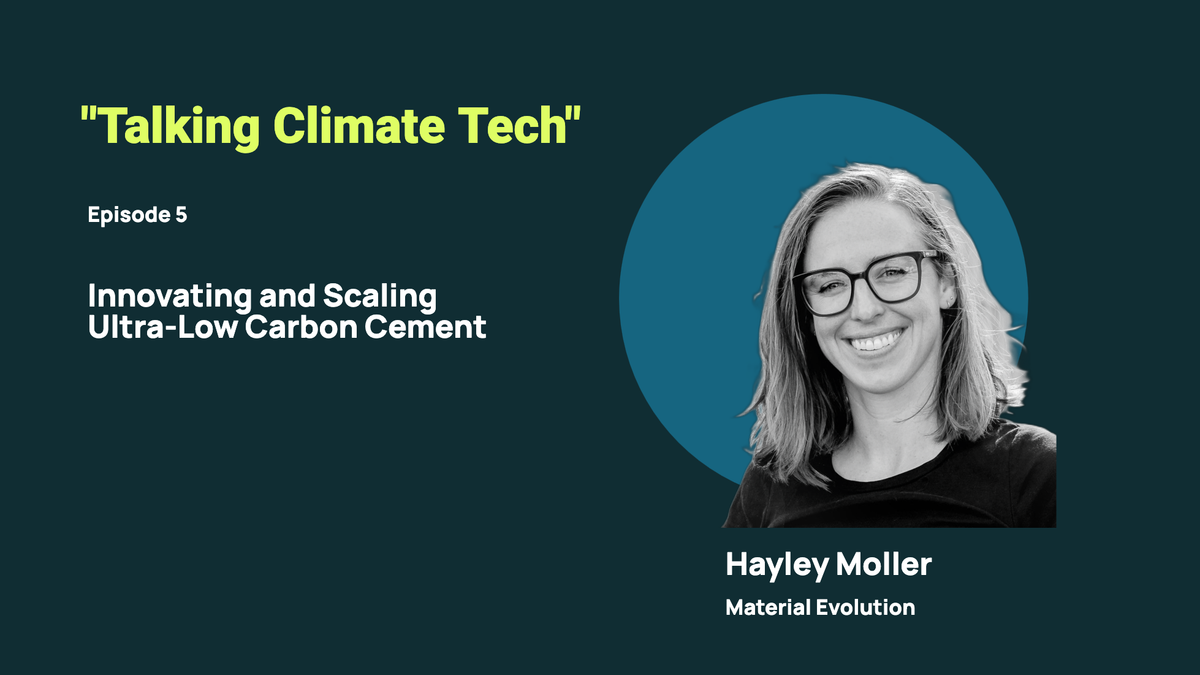🎙️EP05 - Innovating + Scaling Ultra-low Carbon Cement
A conversation with Hayley Moller on how we can decarbonise cement production

Welcome to the 5th episode! 🎙️
Introduction
Here we go for EP05, this time it's Hayley Moller of Material Evolution. I met Hayley at the Innovate UK Materials & Manufacturing Conference, Feb 25, my visit notes here.
We had a great discussion on the day, and I thought she would make a fantastic guest. Cement can't always be exciting, but Hayley has a great way of communicating the innovation, passion and dynamics involved in this challenging, hard-to-abate sector.
That said, others have tried to make cement and concrete exciting, and succeeded. Referenced by Hayley in the conversation; if you want to learn about the comparative flexural and compressive strength properties of finished concrete, Miley Cyrus has a fantastic video, 'Wrecking Ball'.
Head to the bottom of the page. ⬇️.
As we try and focus back on cement, Hayley takes us through how Material Evolution is revolutionising the cement industry with an ultra-low-carbon chemistry, and what the role of AI is in accelerating chemistry and feedstock selection.
Hayley shares her journey from carbon markets and climate communications into a traditionally male-dominated sector, emphasising the importance of diversity and multi-disciplinary team collaboration in driving change.
Material Evolution is led by founders Dr Liz Gilligan, CEO and Sam Clark, COO.
A reminder of the scale and challenge - concrete, the finished product that utilises cement, is the second most consumed material globally. 🤯
Water, approx 9 billion cubic meters, followed by concrete at 4.16 billion cubic metres annually. Let that sink in!
Material Evolution are taking on the challenge of developing ultra-low carbon cement for concrete production.
Cement is approximately 8% of global CO2 emissions.
If that wasn't massive enough, as it stands, we aren't moving the dial significantly yet on emissions reduction, and the target becomes even harder. ⌛
IEA targets an emissions intensity reduction from a stubborn 0.6 t CO2 per tonne of cement produced, by -3% per year through to 2030.
Just hit play below and watch right here on the page! 🎬 🍿
Use the player controls to expand to full screen or adjust to your preferred video window size. ✅
Chapter summary below the player for your guidance...
Chapters
What's next?
As always, would love to get your feedback on this episode and what/who else you might like to see. 🗣️
And yes the eagle eyed among you will have noticed we have skipped 04, back to that soon!
Up next in EP06, James Macnaghten from Caldera who are scaling thermal energy storage - stand by... ♨️
Hope you enjoyed this one, on we go!
Kane
Here is Miley Cyrus concrete demo involving a 'Wrecking Ball' and well, little else. 1.2 billion views - who knew concrete could be so popular? 🤷♂️





